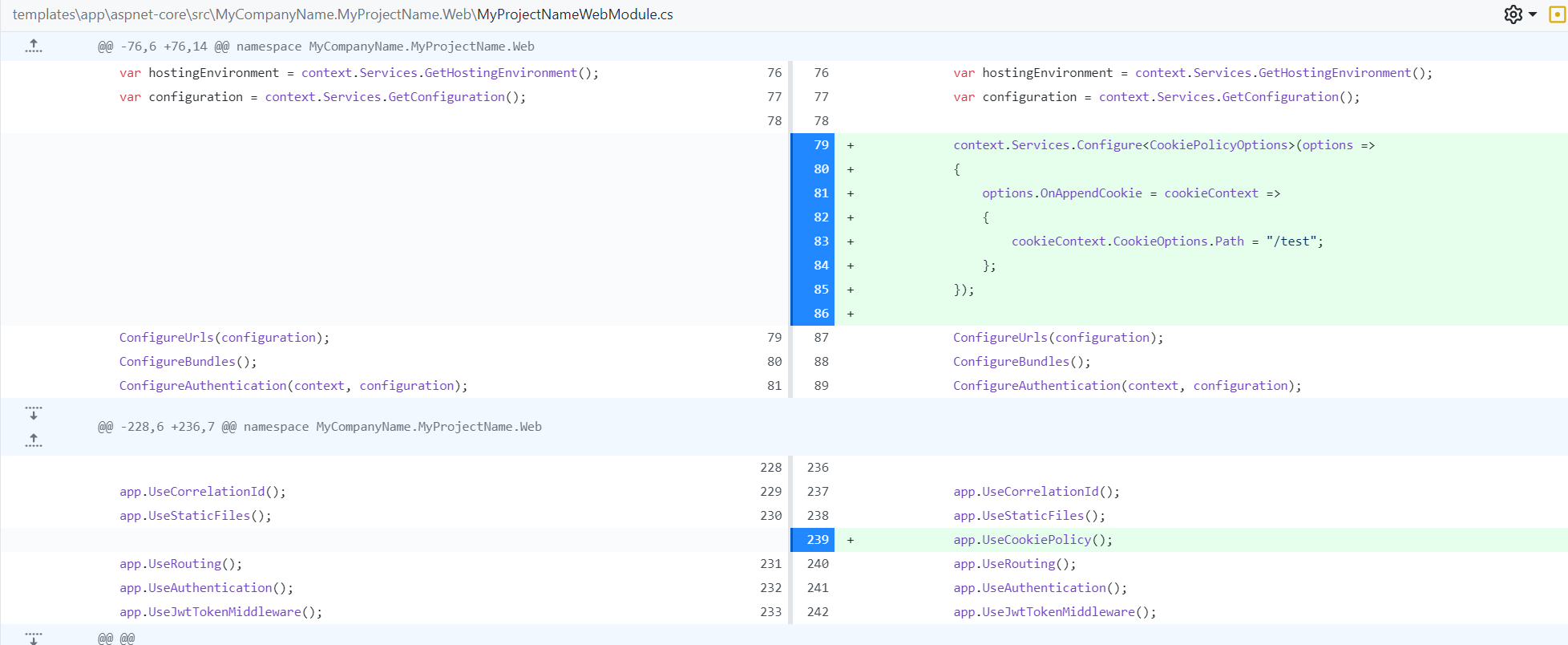أنشطة "Anjaneyulu"
Then you can create a middleware as below and get the generated cookie and pass it to the
RequestVerificationTokenheader.P.S. If your GET requests don't change the state (and it shouldn't in most cases), you don't need to add anti-forgery token validation, in my opinion.
public class SetRequestVerificationHeaderMiddleware { private readonly RequestDelegate _next; private readonly IAbpAntiForgeryManager _abpAntiForgeryManager; public ValidateAntiForgeryTokenMiddleware(RequestDelegate next, IAbpAntiForgeryManager abpAntiForgeryManager) { _next = next; _abpAntiForgeryManager = abpAntiForgeryManager; } public async Task Invoke(HttpContext context) { if (HttpMethods.IsGet(context.Request.Method)) { var antiForgeryToken = await _abpAntiForgeryManager.GenerateToken(); context.Request.Headers["RequestVerificationToken"] = antiForgeryToken; } await _next(context); } } //use middleware app.UseMiddleware<SetRequestVerificationHeaderMiddleware>();
We have added this configuration, but when we remove the request verification token from requests, response is still perfect. Are we missing something ? Please guide.
Hi @Anjaneyulu, I think you don't need to create a manual Anti Forgery Token Middleware. Instead, you can define
AbpAntiForgeryOptionsto enable auto validation for GET requests.Configure<AbpAntiForgeryOptions>(options => { //By default only POST requests auto validate anti forgery tokens. //In other word "GET", "HEAD", "TRACE" and "OPTIONS" HTTP methods are ignored. options.AutoValidateIgnoredHttpMethods.Remove("GET"); //auto validate for GET requests });See CSRF Anti Forgery documentation for more information
Hi @EngincanV , I have configured as you said
Configure<AbpAntiForgeryOptions>(options => { //By default only POST requests auto validate anti forgery tokens. //In other word "GET", "HEAD", "TRACE" and "OPTIONS" HTTP methods are ignored.
options.AutoValidateIgnoredHttpMethods.Remove("GET"); //auto validate for GET requests });
Im not receving any data in get request. Do i need to add anything else ?
hi
Is
Emailing\Templates\Templates\*.tplpath correct?Maybe
Emailing\Templates\*.tpl
I have updated the path. Also, tried setting build actions to copy always for embedded resources. But im getting the same issue.
<Project Sdk="Microsoft.NET.Sdk">
<Import Project="....\common.props" />
<PropertyGroup> <TargetFramework>netstandard2.0</TargetFramework> <RootNamespace>Test</RootNamespace> </PropertyGroup>
<ItemGroup> <ProjectReference Include="..\Test.Domain.Shared\Test.Domain.Shared.csproj" /> </ItemGroup>
<ItemGroup> <ProjectReference Include="....\modules\Volo.Account.Pro\src\Volo.Abp.Account.Pro.Shared.Application.Contracts\Volo.Abp.Account.Pro.Shared.Application.Contracts.csproj" /> <PackageReference Include="Volo.Abp.PermissionManagement.Application.Contracts" Version="4.4.2" /> <PackageReference Include="Volo.Abp.FeatureManagement.Application.Contracts" Version="4.4.2" /> <PackageReference Include="Volo.Abp.SettingManagement.Application.Contracts" Version="4.4.2" /> <PackageReference Include="Volo.Saas.Host.Application.Contracts" Version="4.4.2" /> <PackageReference Include="Volo.Abp.AuditLogging.Application.Contracts" Version="4.4.2" /> <ProjectReference Include="....\modules\Volo.Identity.Pro\src\Volo.Abp.Identity.Pro.Application.Contracts\Volo.Abp.Identity.Pro.Application.Contracts.csproj" /> <PackageReference Include="Volo.Abp.IdentityServer.Application.Contracts" Version="4.4.2" /> <ProjectReference Include="....\modules\Volo.Account.Pro\src\Volo.Abp.Account.Pro.Public.Application.Contracts\Volo.Abp.Account.Pro.Public.Application.Contracts.csproj" /> <ProjectReference Include="....\modules\Volo.Account.Pro\src\Volo.Abp.Account.Pro.Admin.Application.Contracts\Volo.Abp.Account.Pro.Admin.Application.Contracts.csproj" /> <PackageReference Include="Volo.Abp.LanguageManagement.Application.Contracts" Version="4.4.2" /> <ProjectReference Include="....\modules\Volo.TextTemplateManagement\src\Volo.Abp.TextTemplateManagement.Application.Contracts\Volo.Abp.TextTemplateManagement.Application.Contracts.csproj" /> <ProjectReference Include="....\modules\Volo.LeptonTheme\src\Volo.Abp.LeptonTheme.Management.Application.Contracts\Volo.Abp.LeptonTheme.Management.Application.Contracts.csproj" /> </ItemGroup>
<ItemGroup> <EmbeddedResource Include="Emailing\Templates*.tpl" /> <None Remove="Emailing\Templates*.tpl" /> </ItemGroup>
</Project>
hi
Can you share the csproj(ApplicationContractModule) file?
<Project Sdk="Microsoft.NET.Sdk">
<Import Project="..\..\common.props" />
<PropertyGroup>
<TargetFramework>netstandard2.0</TargetFramework>
<RootNamespace>Test</RootNamespace>
</PropertyGroup>
<ItemGroup>
<ProjectReference Include="..\Test.Domain.Shared\Test.Domain.Shared.csproj" />
</ItemGroup>
<ItemGroup>
<ProjectReference Include="..\..\modules\Volo.Account.Pro\src\Volo.Abp.Account.Pro.Shared.Application.Contracts\Volo.Abp.Account.Pro.Shared.Application.Contracts.csproj" />
<PackageReference Include="Volo.Abp.PermissionManagement.Application.Contracts" Version="4.4.2" />
<PackageReference Include="Volo.Abp.FeatureManagement.Application.Contracts" Version="4.4.2" />
<PackageReference Include="Volo.Abp.SettingManagement.Application.Contracts" Version="4.4.2" />
<PackageReference Include="Volo.Saas.Host.Application.Contracts" Version="4.4.2" />
<PackageReference Include="Volo.Abp.AuditLogging.Application.Contracts" Version="4.4.2" />
<ProjectReference Include="..\..\modules\Volo.Identity.Pro\src\Volo.Abp.Identity.Pro.Application.Contracts\Volo.Abp.Identity.Pro.Application.Contracts.csproj" />
<PackageReference Include="Volo.Abp.IdentityServer.Application.Contracts" Version="4.4.2" />
<ProjectReference Include="..\..\modules\Volo.Account.Pro\src\Volo.Abp.Account.Pro.Public.Application.Contracts\Volo.Abp.Account.Pro.Public.Application.Contracts.csproj" />
<ProjectReference Include="..\..\modules\Volo.Account.Pro\src\Volo.Abp.Account.Pro.Admin.Application.Contracts\Volo.Abp.Account.Pro.Admin.Application.Contracts.csproj" />
<PackageReference Include="Volo.Abp.LanguageManagement.Application.Contracts" Version="4.4.2" />
<ProjectReference Include="..\..\modules\Volo.TextTemplateManagement\src\Volo.Abp.TextTemplateManagement.Application.Contracts\Volo.Abp.TextTemplateManagement.Application.Contracts.csproj" />
<ProjectReference Include="..\..\modules\Volo.LeptonTheme\src\Volo.Abp.LeptonTheme.Management.Application.Contracts\Volo.Abp.LeptonTheme.Management.Application.Contracts.csproj" />
</ItemGroup>
<ItemGroup>
<EmbeddedResource Include="Emailing\Templates\Templates\*.tpl" />
<None Remove="Emailing\Templates\Templates\*.tpl" />
</ItemGroup>
</Project>
hi
You are configure the
ApplicationCookienotXSRFandAntiforgery.Can you explain the reason to change the
path?
Hi,
Basically when i hosted the application cookie path is coming as default root path i.e., path='/'.
But i want to set the path to application folder in IIS when hosted.
Can you please help to set that properly.
